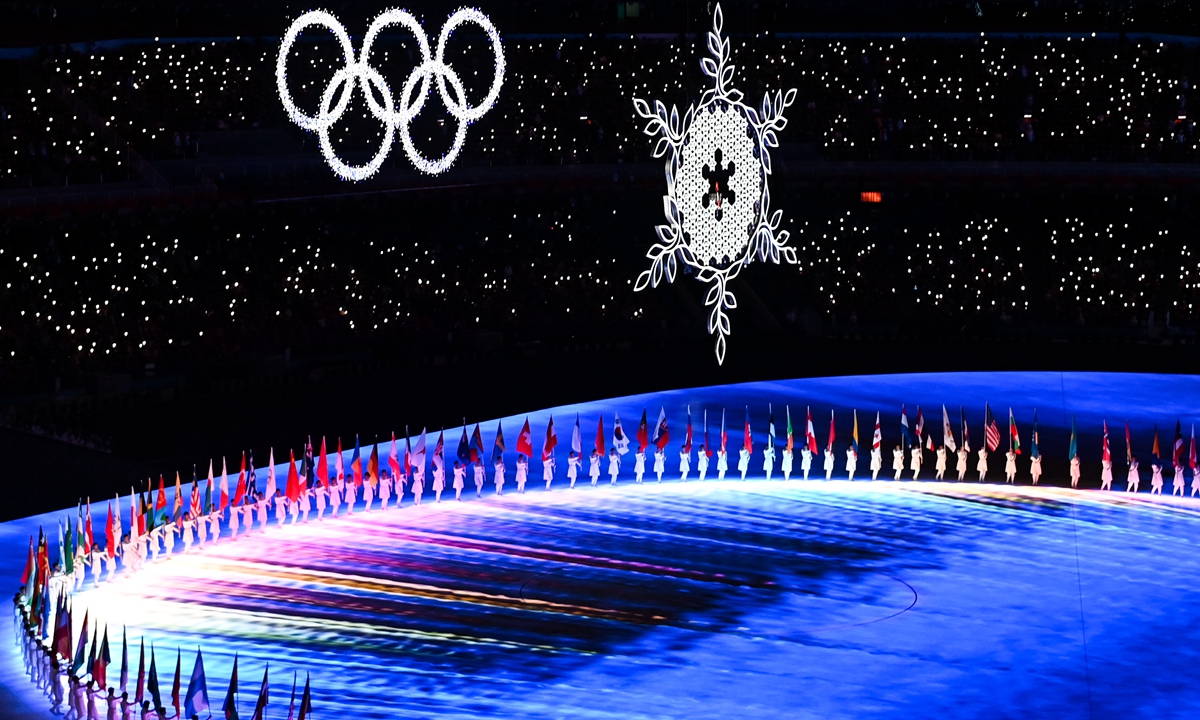
Closing ceremony of Beijing 2022 Olympic Winter Games at National Stadium in Beijing on February 20, 2022. Photo: VCG
With Beijing drawing the curtain on the Winter Olympic Games after Sunday night's spectacular closing ceremony, the Chinese capital has seen a peak of foreigners' departure as over 6,000 delegation members left the city on Monday. Under coordinated efforts of staffers at the airports, the Olympic Village and other related venues, Beijing has done its best to safeguard their exit in a safe, orderly, and swift fashion, the Global Times learned.
A staffer at the Beijing Capital International Airport said that there were 39 outbound flights on Monday, involving more than 6,000 people and nearly 20,000 pieces of luggage, and the return peak is expected to last until Tuesday, media reported.
According to the manual for the Beijing Winter Olympics, foreign Olympic participants should leave China within 48 hours after finishing their competitions or after the closing ceremony. They will be transported to the airport inside the closed loop.
The Beijing Capital International Airport announced on Saturday that its Terminal 3 will suspend opening to the public starting Sunday and will be used for Winter Olympics flights only.
Olympics personnel will pass through the T3-C and T3-E international departure protection zones in line with the closed-loop management protocols, Sun Jianying, an official from the Beijing Organizing Committee's airport operation team said, adding that regulators have set up an on-site headquarters and established a liaison mechanism to ensure efficient and rapid response to various tasks.
Although the number of passengers and luggage from the Olympics' closed-loop is huge, the average time spent in the departure process is only less than an hour, media reported on Monday.
The key to improving the efficiency of departures is to separate the flow of people and prepare in advance, staffers at the airport explained. For example, flight information is released on the Winter Olympics Pass app in advance so that passengers can sort out their prohibited items for a quick check-in.
Nucleic acid tests, temperature measurements and other materials needed for departure have been moved forward from the airport to the Olympic Villages. "We will prepare different kinds of services in accordance with their countries' entry requirements, and arrange buses to send them to the airport," a volunteer in the Yanqing Olympic village surnamed Li told the Global Times on Monday.
Customs has also moved the service counter forward to the Olympic village, completing customs declaration and inspection work of luggage at the village and then load them to the airport in separate batches with the passengers, Li noted.
Kang Jiahao, a senior at the Hebei Agricultural University who served as an arrival and departure assistant during the Winter Olympics, told the Global Times that the volunteers have been explaining to the foreigners about the epidemic prevention policies in their destinations and transfer countries, making sure they are taken good care of from the point where they are picked up by the buses to boarding the planes.
After the closing ceremony gave a perfect conclusion to the 17-day Beijing Winter Olympics, the Beijing municipal government released
a letter of thanks to its 21 million residents for their contributions that enable Beijing to present the world a streamlined, safe, and wonderful Olympic event and write a new historical chapter of the first city to host both the Summer and Winter Olympics.
"Holding the vision of being open, sharing, and honest, Beijing together with Zhangjiakou overcame risks and challenges brought by COVID-19 and presented the world a streamlined, safe, and wonderful Olympic event, showing China as a sunny, prosperous, open, and hopeful country," it said.




